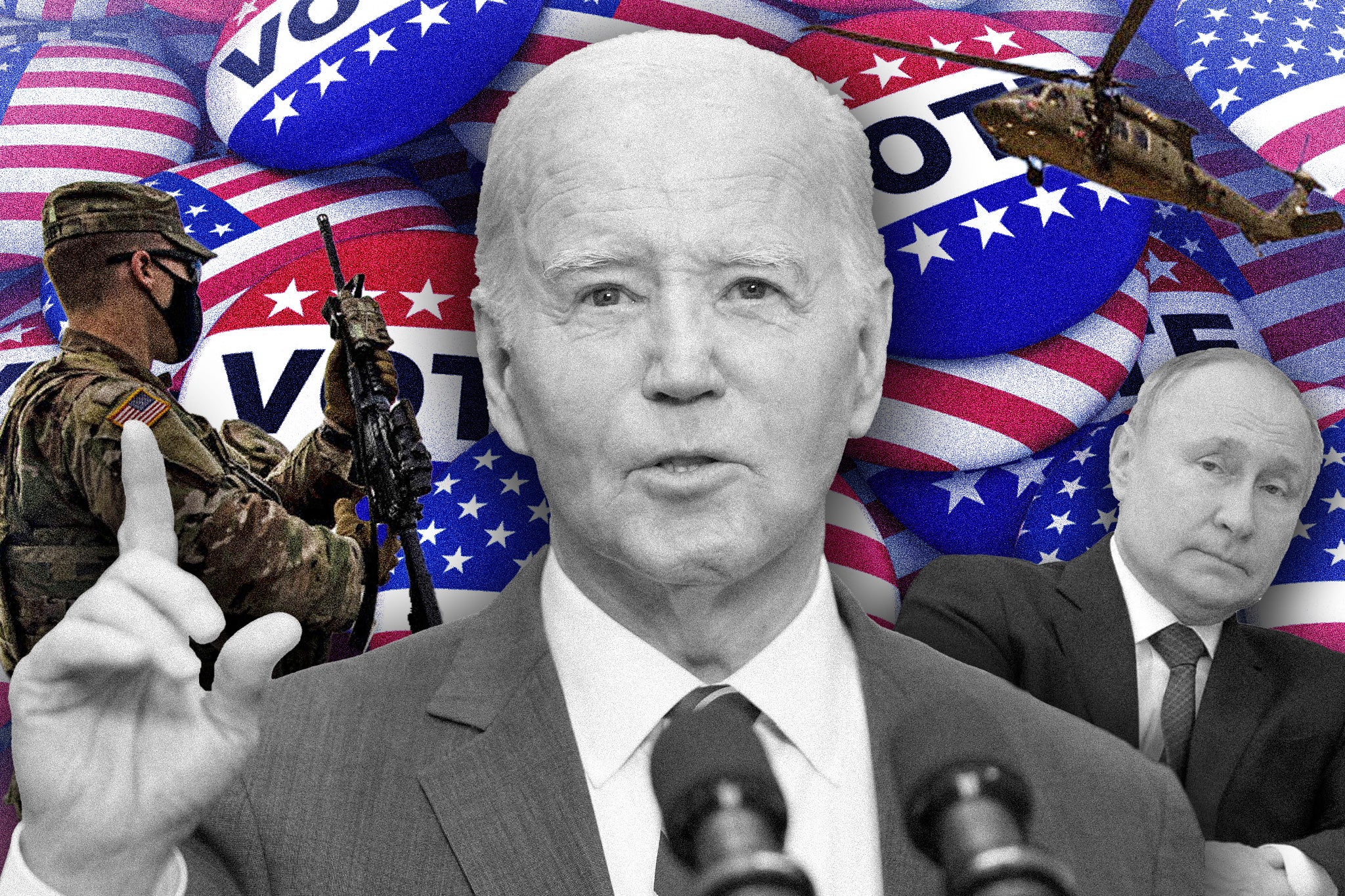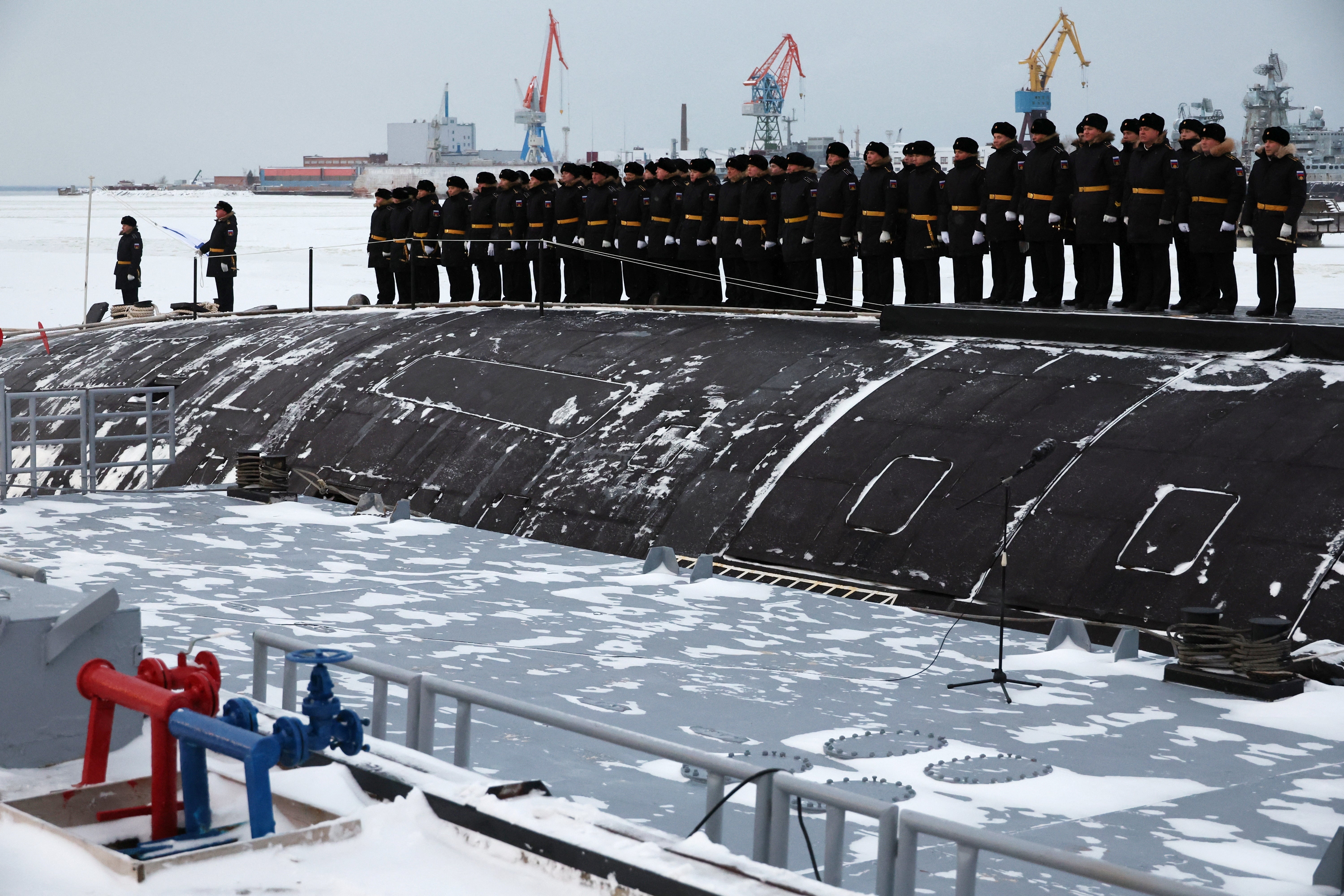How to read Putin’s poker face as he bets large on victory in 2024
As the two year anniversary of the Ukraine war looms, Vladimir Putin appears confident that the cards are stacked in his favour. However, there is a flaw in his game plan, says Russian expert and author Mark Galeotti – and it could prove fatal

Last week Vladimir Putin held his annual marathon press conference and town hall, and he gave no hint of any give in his approach to the war. After all, he may well feel that, after a disastrous 2022, this past year has been more successful than expected, allowing him to gamble on 2024 as the year he may be able to wrest some kind of victory from the initial catastrophic blunders of the invasion.
Certainly, he expressed satisfaction with the situation on the battlefield, asserting that Russian forces were doing well all along the front line. As for this year’s Ukrainian counteroffensive, “none of it worked anywhere,” he claimed. “I don’t even know why they do this. They are just sending their men out to be destroyed. It’s a one-way ticket.” Of course, this was not above outright fabrication – such as his claim that Ukrainian losses substantially exceeded Russian – but in essence he is quite satisfied with a stalemate. For the moment.
Putin’s strategy for 2024 will not depend on some major breakthrough on the battlefield, although we can expect the Russians to continue to try. Rather, it is that he can at once maintain the pressure on Kyiv and let “Ukraine fatigue” in the United States and Europe steadily mount. As he put it, “Ukraine produces almost nothing today, everything is coming from the West, but the free stuff is going to run out some day, and it seems it already is.”

This was an unsubtle reference to the decision by Republican senators to block a bill that would have guaranteed $61bn (£48bn) in military and civil support for Ukraine through 2024. Although there is still a chance for some deal to be struck before the end of year recess, the odds are that this will have to be revisited in January, and perhaps in a more limited form. This came as an embarrassment to president Volodymyr Zelensky, who had visited Washington in the hope of breaking the deadlock, and for now will have to be content that the latest National Defence Authorization Act includes provision for another $300m (£236m) for the Ukraine Security Assistance Initiative over the next three years.
This seems to have emboldened Putin, who in last Thursday’s press conference gave no sense of any willingness to talk with Ukraine, much less compromise, saying that he would continue until “we have achieved our goals… and those goals have not changed.” If anything, he actually signalled a toughening of his position, not just asserting that the port of Odessa “is a Russian city” but also reviving the original objectives of “de-Nazifying and demilitarising” Ukraine.
What is curious about this language deployment, is that even most Kremlin propagandists have largely stopped using these terms, implicitly accepting that they are quite meaningless and impossible to quantify. They are, however, being used as a shorthand for a Ukraine that, while not necessarily under direct control from Moscow, is neutralised and eventually forced to accept neutrality rather than EU or NATO membership and thus relegated to Russia’s sphere of influence.
Looking to the coming year, the balance of power certainly appears to have tilted towards Moscow. The Russian economy is relatively buoyant, with Putin asserting that its GDP will increase by 3.5 per cent year-on-year, and that even while inflation may stay around the 7-8 per cent mark, growth will be stable. Perhaps a third of the coming year’s budget is devoted to the war and associated security spending. Meanwhile, even if sanctions have eaten into its production of the most sophisticated systems, Russia continues to outproduce not just Ukraine, but the West in the more basic requirements of modern war, such as artillery ammunition.
Yet it is not clear whether Putin truly appreciates just how far he may be gambling on a decisive success in 2024. Many of the strengths on which he is currently counting are fragile and likely to diminish across the course of the next 12 months. His economy is unlikely to collapse, whatever extra sanctions are imposed, but conversely it is already feeling the strain of its conversion to wartime conditions. This also imposes a constraint on mobilising extra troops which, apart from being deeply unpopular, would also eat into the available industrial workforce.
Nor can Putin necessarily assume that the Russian people will be cowed forever. During his town hall, the screen behind him showed a sequence of text messages sent in by his citizens, and these included plaintive questions about when the war would end, as well as tongue-in-cheek questions about “why your reality differs from ours?” and “how can I move to the Russia they talk about on TV Channel One?”
This is an increasingly brutal authoritarianism, and most citizens will not dare openly protest the war, even though only a minority actively support it. Nonetheless, there is a rising tide of both civic protest, like the vigils held by the wives and mothers of mobilised soldiers, as well as a small radical movement willing to sabotage the war effort. High-profile opposition figures such as the liberal Alexei Navalny and the nationalist Igor “Strelkov” Girkin have been imprisoned – the former has disappeared from view for nearly a fortnight and may be heading to a top-security facility – but it is much harder for the Kremlin to handle more widespread and sometimes covert protest.

The real fear is that economic problems will spark wider unrest, and in this context it is notable that when the Finance Ministry drew up this budget with such substantial defence spending – 6 per cent of GDP, compared with the NATO target of 2 per cent – it worked on the assumption that this could be cut back in 2025.
Meanwhile, Western investment in ammunition production will start to bear fruit by the end of 2024, new weapons systems such as F-16 fighters are due to be handed over to Ukraine, and while Hungary is continuing to hold up the next aid package, the European Council has agreed to open EU membership talks. Even the prospect of the re-election of Donald Trump at the end of 2024, which some in the West believe would be the greatest gift to Putin, would be a mixed blessing, at best. Trump may have spoken highly of Putin and memorably claimed that he could end the war in a day, but the track record of his first presidency would not necessarily be much comfort for the Kremlin. He was deeply disruptive to NATO, to be sure, but US policy towards Russia was tougher than ever by the end of his presidency. He continued military support for Ukraine and sanctions on Russia, and pulled out of the 1987 Intermediate Range Nuclear Forces Treaty claiming that Moscow was cheating.
With Kyiv beginning to mirror the Russians and fortifying the front line, the risk that this war does bog down into a more static and long-term stalemate may increase. This is hardly something that would please the Ukrainians, who are still committed to liberating all the occupied territories, but the more Putin talks up expansive war aims that entail more than just holding the present line, the more he sets himself up for embarrassment.
The budget will struggle if it has to retain the current level of military spending, and he even seemed to rule out another wave of mobilisations, at least as things currently stood. As one Russian military observer commented, “does he really expect people to keep throwing themselves into the meat grinder of their own accord?” In his rather colourless way, Putin seems to have allowed his temporary good standing to have gone to his head. Although 2024 is looking set to be a rough year for Ukraine, the kind of triumph he seems to be imagining still seems unlikely.
Dr Mark Galeotti is the author of Putin’s Wars: From Chechnya to Ukraine (Osprey/Bloomsbury, 2022)






Join our commenting forum
Join thought-provoking conversations, follow other Independent readers and see their replies
Comments